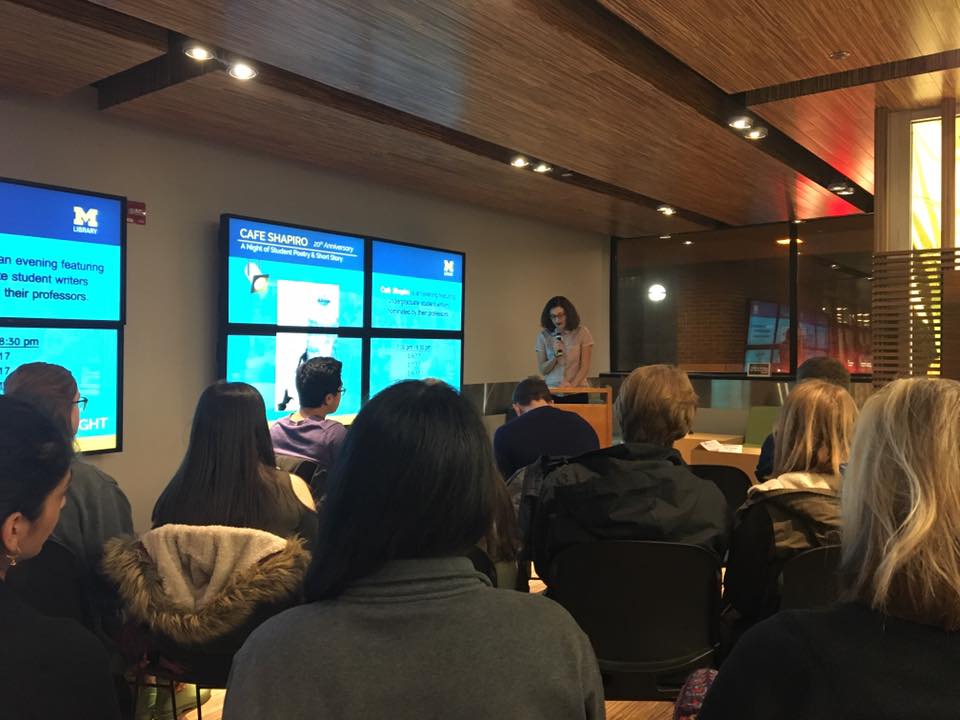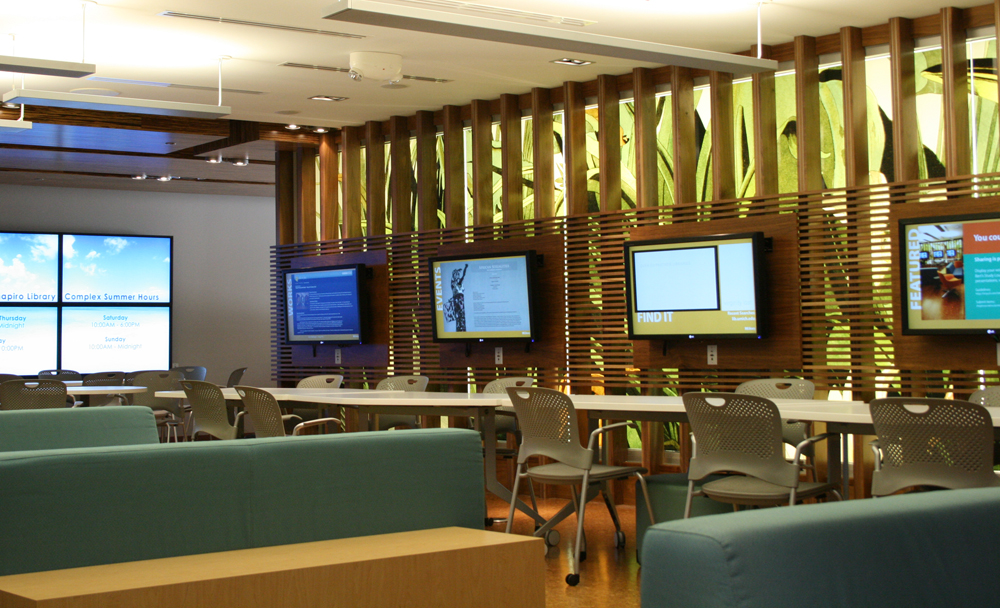Café Shapiro always inspires the writer in me to go home and create something worth reading in front of an audience. That being said, reading in front of an audience is difficult for me. The director of the event last night made sure we knew that this was the first time some of the authors had ever read in front of a group of people, and that made the experience all the more admirable from where I sat.
My only issue with Café Shapiro was that there wasn’t a collective list of the readers printed anywhere. There are screens in the lobby of the Ugli that alternate from author to author on a slideshow, featuring a picture of them and a bit about their lives. There is not, however, a collective program for the event. From the standpoint of someone looking to write an article about the event, it made the prospect of spelling everyone’s names and catching everyone’s majors a bit daunting.
Despite this, Café Shapiro is definitely a tradition that should continue. Matching the university’s bicentennial with the event’s 20th anniversary was a cool parallel. The director told us at the beginning of the reading that Café Shapiro was originally meant to serve as a “coffee break” for students… before, of course, a café was built in the same lobby.
Laura Dzubay was the first reader, a sophomore majoring in English and one of my friends. She read an excerpt from her short story “Paradise.” It is set in the 1960s and is about a small town about to be bought out by a major company looking to monopolize the town. The story features a group of young people looking for their friend Michael, who went missing a few months back. All of the families were moving away due to job loss, including Michael’s. Some of the dialogue in the story, however, really spoke to me about one’s loyalty to their home (being from a small town myself, I can relate). “‘It’ll poison the air,’ they said. ‘It’ll poison every one of us.'” In spite of this threat, the kids still don’t want to leave their home (or their friend).
“Paradise” also drew attention to the classic nature vs. machine narrative we’re seeing so often nowadays in regards to climate preservation. The story progressed to the kids exploring the forest, traveling so far that the familiar trees seemed “sinister” and “alien.” Even something as familiar as home can suddenly turn hostile with the introduction of the outside world.

The second author was Zoya Gurm, an undeclared freshman, reading “Marcy.” It was a story about a girl who was clearly an outcast in society. Marcy was in an uneasy friendship with the narrator, and the narrator’s guilt at their relationship’s lack of substance was apparent when Marcy died. The story detailed the efforts of the community to remember Marcy, if anything “just so [they] could say [they] did.” The romanticism, of sorts, of Marcy’s death echoed, again, my experience with small town life. If something happens to someone in the community, even if we don’t know them that well, the entire town shows their (albeit temporary) support.
Thirdly, Luc Le Pottier, a freshman majoring in physics, read his unfinished, untitled essay. I enjoyed listening to him read just because he was so familiar with his words – it was apparent in his voice. His tone matched the stream-of-conscoius way the narrative was presented. The piece was about the narrator’s experience working as a cook for a restaurant and how he had a different (temporary) perspective about his job there compared to his coworkers (who absolutely needed the job). The author managed to keep the reader in the moment while occasionally interrupting the story to insert an analysis, a talent which I admire for critical writing.
The fourth author was a senior studying biochemistry and English, Pei Hao. He read a series of poems based on Chinese poetry. I’ve never heard poetry in Mandarin before, and I noticed the differences in the rhythm patterns. There was still a distinct rhythm, but it showed up in different ways and inflections than it does in English. The English translations were rich with description but did so without too many words. For instance, “the birds are silent; the people are few,” was a line from one of Hao’s poems that I enjoyed for its tangibility.
After Pei Hao, Josh Mandilk read a piece of fiction titled “You Can’t Drown a Fish.” Mandilk is studying English and health fitness. His delivery was strikingly matter-of-fact despite the sensitive content of his piece. It was about a boy whose brother struggled all his life with drugs and mental health, but detailed how important the brother’s art was to both him and to his family, who suffered along with him. As children, the brothers would act out war scenes and “turn the forest we knew so well into something menacing.” That quote outlines the power of a child’s imagination, and maybe served as a foreshadowing of what was to come.
Alexa Zielinski, a freshman studying psychology, read an essay afterward. The essay was inspired by a They Might Be Giants song, which was an interesting tidbit of backstory. The essay itself was about a father’s struggle with alcoholism, and was written with vivid language and tangible emotion. Zielinski split the essay into parts, and although it caught my attention, it was difficult to follow verbally.
Grace Morris read next, an undeclared freshman. She read both fiction and a poem. Her fiction piece was witty and metaphoric, detailing the narrator’s experience with God in the form of a rabbit. Despite the creativity, I was lost about whether or not God became a rabbit in the progression of the story or if God was the rabbit the whole time and I missed it. Her poem was more whimsical, entitled “Red.”
Bharat Nair read his poetry next. He is a junior in the School of Information. He had a fantastic handle on poetic language, using oxymorons such as “luscious putridity” in a way that made sense. The two poems he read seemed to contrast in tone, which served as a refreshing thing to focus on as a member of the audience but left me confused about how to analyze it.
Tommy Hawthorne, a senior majoring in double bass performance, read more poetry. His poems were clever, using common sayings like “just keep swimming” in an aggressive, mocking way. It was written about octopi… from the perspective of an octopus. Despite that, he glossed everything over with a cute ending: “The coat on my back is yours and I will bend it to whatever color most pleases you.” He read a few more poems, among those were “Sound” and “Silver.”
Lastly, Erez Levin, a senior studying musical arts, read poetry. His tone was playful and reminded me of a narrator for a medieval TV show (for example, Merlin). He did this, however, with a modern twist, claiming at the end of his performance (for it was, truly, more a performance than a reading) that it was all a true story. His humor was an entertaining finale to a good night of literature!




